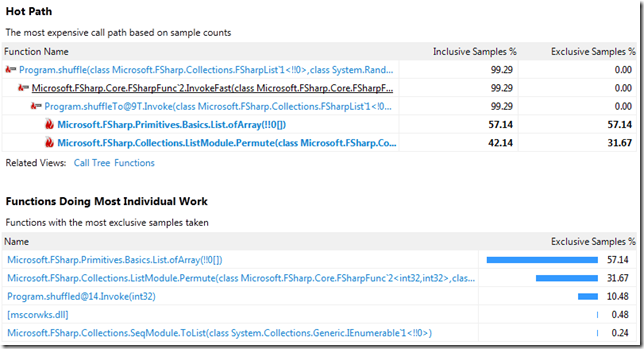Optimizing some old F# code
06 May 2012I am digging back into the Bumblebee code base, to clean it up before talking at the New England F# user group in Boston in June. As usual for me, it’s a humbling experience to face my own code, 6 months later, or, if you are an incorrigible optimist, it’s great to see that I am so much smarter today than a few months ago…
In any case, while toying with one of the samples, I noted that performance was degrading pretty steeply as the size of the problem was increasing. Most of the action revolved around producing random shuffles of a list, so I figured it would be interesting to look into it and see where I messed up how this could be improved upon.
Here is the original code, a quick-and-dirty implementation of the Fisher-Yates shuffle:
open System
let swap fst snd i =
if i = fst then snd else
if i = snd then fst else
i
let shuffle items (rng: Random) =
let rec shuffleTo items upTo =
match upTo with
| 0 -> items
| _ ->
let fst = rng.Next(upTo)
let shuffled = List.permute (swap fst (upTo - 1)) items
shuffleTo shuffled (upTo - 1)
let length = List.length items
shuffleTo items length
[<EntryPoint>]
let main argv =
let test = [1..10000]
let random = new Random()
let shuffled = shuffle test random
System.Console.WriteLine("done...")
0
Running the test case in fsi, using #time, produces the following:
Real: 00:00:42.735, CPU: 00:00:42.734, GC gen0: 2307, gen1: 6, gen2: 0
(Digression: #time is absolutely awesome – just typing #time;; in a fsi session will automatically display performance information, allowing to quickly tweak a function and fine-tune it “on the fly”. I wish I had known about it earlier.)
My initial assumption was that the problem revolved around performing multiple permutations of a List. However, I figured it would be interesting to take the opportunity and use the Performance Analysis tools provided in VS11 – and here is what I got:

Uh-oh. Looks like the shuffle is spending most of its time doing comparisons in the swap function – and what the hell is HashCompare.GenericEqualityIntrinsic doing in here? Something is off.
Looking into the swap function provides a hint:

F# has identified that the function could be made generic. It’s great, but in our case it comes with overhead, because we simply want to compare integers. Let’s mark the function as inline, to avoid that problem (we could also make the function non-generic, by marking one of the inputs as integer):

Shuffling a list of 10,000 elements is now down to 3 seconds, instead of 43:
Real: 00:00:03.361, CPU: 00:00:03.359, GC gen0: 793, gen1: 2, gen2: 0
… and most of the work is happening where we would expect it, that is, in permutations. However, it also looks like List.ofArray is pretty busy, and we don’t have a single reference to Array in the code – what’s going on there? Turns out, List.permute actually converts the List to an Array (thanks, StackOverflow), permutes it and converts it back, which makes sense given that List is a linked list. This means that for a list of n elements, we are converting n times from list to array and back, maybe we can avoid some of that noise and do all the permutation work on an Array:
let inline swap fst snd i =
if i = fst then snd else
if i = snd then fst else
i
let shuffle items (rng: Random) =
let rec shuffleTo items upTo =
match upTo with
| 0 -> items
| _ ->
let fst = rng.Next(upTo)
let shuffled = Array.permute (swap fst (upTo - 1)) items
shuffleTo shuffled (upTo - 1)
let array = List.toArray items
let length = Array.length array
shuffleTo array length |> Array.toList
#time tells us we are now down to 1 second:
Real: 00:00:01.188, CPU: 00:00:01.250, GC gen0: 159, gen1: 2, gen2: 1
And the bulk of the work is now in Array.permute:

At that point, I can’t think of obvious ways to improve this, except by trying to avoid Array.permute. Let’s do that, and see if we can shuffle indexes in place in a single array, instead of applying multiple permutations:
let shuffle items (rng: Random) =
let rec shuffleTo (indexes: int[]) upTo =
match upTo with
| 0 -> indexes
| _ ->
let fst = rng.Next(upTo)
let temp = indexes.[fst]
indexes.[fst] <- indexes.[upTo]
indexes.[upTo] <- temp
shuffleTo indexes (upTo - 1)
let length = List.length items
let indexes = [| 0 .. length - 1 |]
let shuffled = shuffleTo indexes (length-1)
List.permute (fun i -> shuffled.[i]) items
We are now down to under 1/100 seconds, and garbage collection is down to nothing:
Real: 00:00:00.008, CPU: 00:00:00.015, GC gen0: 0, gen1: 0, gen2: 0
At that point, I am out of ideas on how to make this better – which is fine, because this looks good enough to me! If you have ideas on how to make this better, I am all ears…
And thank you for people who answered here and here on StackOverflow!
